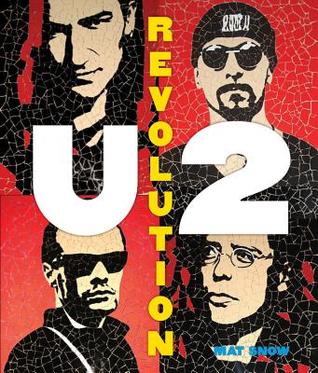 Today, "Five Questions" are put to Mat Snow, author of
Today, "Five Questions" are put to Mat Snow, author of
U2: Revolution. Snow is also the award-winning former editor
of the world-renowned Mojo magazine.
 I thought Bruce Springsteen’s R’n’R Hall of Fame induction speech for U2, which serves as the book’s introduction, got it exactly right and I agreed with almost everything he said. Is U2 the last “great” rock and roll band?
I thought Bruce Springsteen’s R’n’R Hall of Fame induction speech for U2, which serves as the book’s introduction, got it exactly right and I agreed with almost everything he said. Is U2 the last “great” rock and roll band?
You could argue that Nirvana are due that honour, their formation and breakthrough coming when U2 were already a hugely established band, probably the biggest in the world. But where Nirvana's career ended in tragedy, U2 have not only soldiered on but creatively regenerated, with some of their best material coming in the new millennium when they were turning 40. And though a rock and roll band breaking through in the '80s like U2 can never be as "great" as the '60s pioneers, principally the Beatles and Stones, who invented the rock and roll band (with all due credit to the Crickets and Blue Caps in the '50s) as we have understood the concept ever since, U2's artistic, cultural and moral ambition and dedication surely earn them Bruce's accolade. Aside from Nirvana, I really can't see any other contenders for the crown.
The name of the book is, in part, “Revolution.” That’s not a word that’s often used with U2. Is there a meaning behind the title?
“Revolution” is a word that should be used with U2 more often. Throughout their career, they have changed the game, as moral and political evangelists in the '80s, pop-cultural critics in the '90s, and performers who, ever since their 1983 breakthrough, have never shirked a risk or gamble that upturned the conventions of the day — and all from a position bang in the middle of mainstream popularity with an awful lot to lose. Besides which, “Revolution” is snappy, punsome and has a 'u' in the middle.
Let’s talk access: there are some awesome, somewhat embarrassing photos of the band from the early days, as well as killer ephemera. Did U2 provide access to those or did you have to go outside the band?
Outside the band. You would be amazed what diligent picture research will come up with. U2 have never really stood on their dignity, and indeed positively celebrate the naivety of youth when you styled yourself and had fun rather than merely presented a professionally processed brand image.
Do you have a favorite U2 song?
I have five which never fail to get me going: “Until the End of the World,” “Beautiful Day,” “Vertigo,” “Angel of Harlem,” and “11 O'Clock Tick Tock,” which I bought after they blew me away when I first saw them in 1980 as a support act on a college bill in Manchester, England.
Have to ask: was the Apple fiasco more hubris or a well-intentioned misfire?
Bit of both but mostly the latter, and it's all about our generation. I'm around the same age as U2, and though I grew up in London, where access to music was far easier than in Dublin, our teenage years were a time when rock and roll was expensive to own and not even easy to get to hear. Today's 15-year-olds cannot imagine a world where to buy an album cost the equivalent today of around $56! I'm not kidding. How much was an album in 1973? £2.20 on average in Britain. Go onto one of those cost of living calculating websites and it’ll tell you how much purchasing power that equals today: £22.88p. And do you know how much US currency £22.88p would have bought you on my 15th birthday in October 1973? $55.85. An album would cost me my entire monthly allowance, and yet that didn’t stop me from buying albums, pretty much to the exclusion of anything else. That’s how it was was with lots of my friends too, and I'll bet that's how it was with those four guys over in Dublin. Music was very expensive to buy yet it was that important to us we had to buy it anyway. And by investing so much of our money in our music, that reinforced the emotion we invested in music. If music was cheaper to buy or obtain virtually free, as is the case today, maybe we would not have cared so much. So, for our generation, the idea of a top act giving away their new album is a really big deal, a huge gift to fans and even to the unconverted. Had, say, The Who given away their new album in 1973, there would be statues of them in every town square in the Western world. But today, music is an ecology of surfeit rather than shortage, so for the generation brought up in the free music culture, an unwanted U2 album is like any other piece of music spammed to your inbox: unwelcome clutter. But to moan about it as if U2 had knocked on your door, walked in and taken a dump in your bed? Get over yourselves, I say. To U2's credit, they are far more polite about it than I would be in their shoes.
- AMB Blog's blog
- Log in or register to post comments
